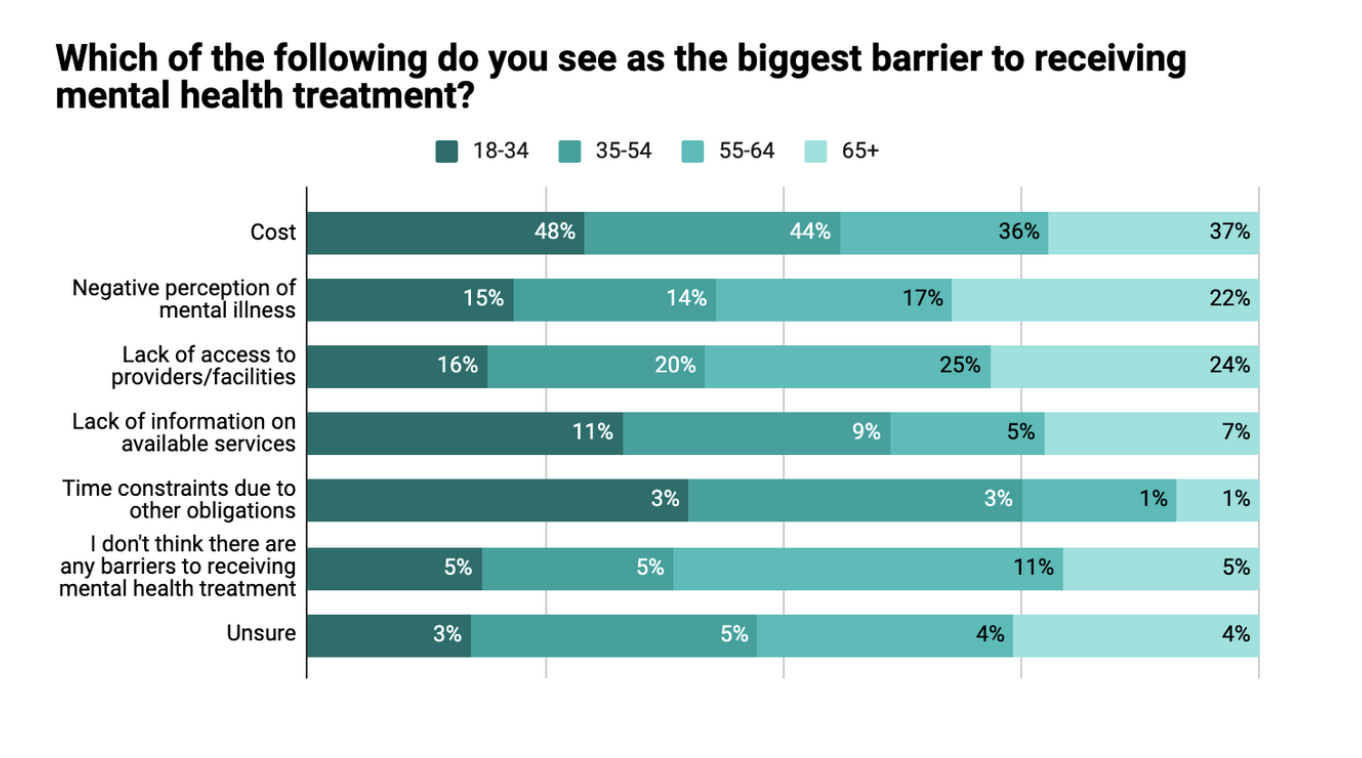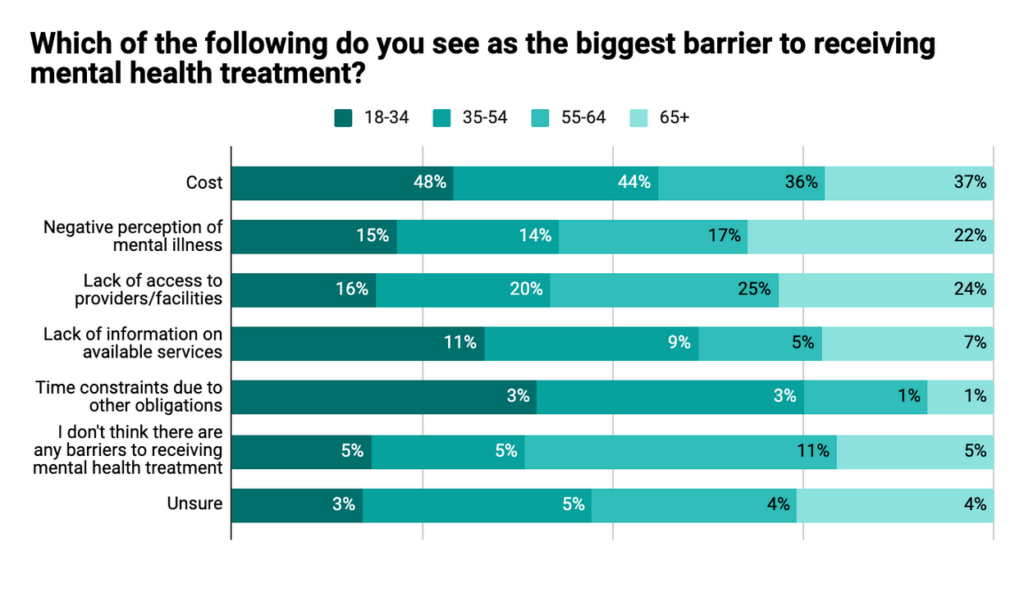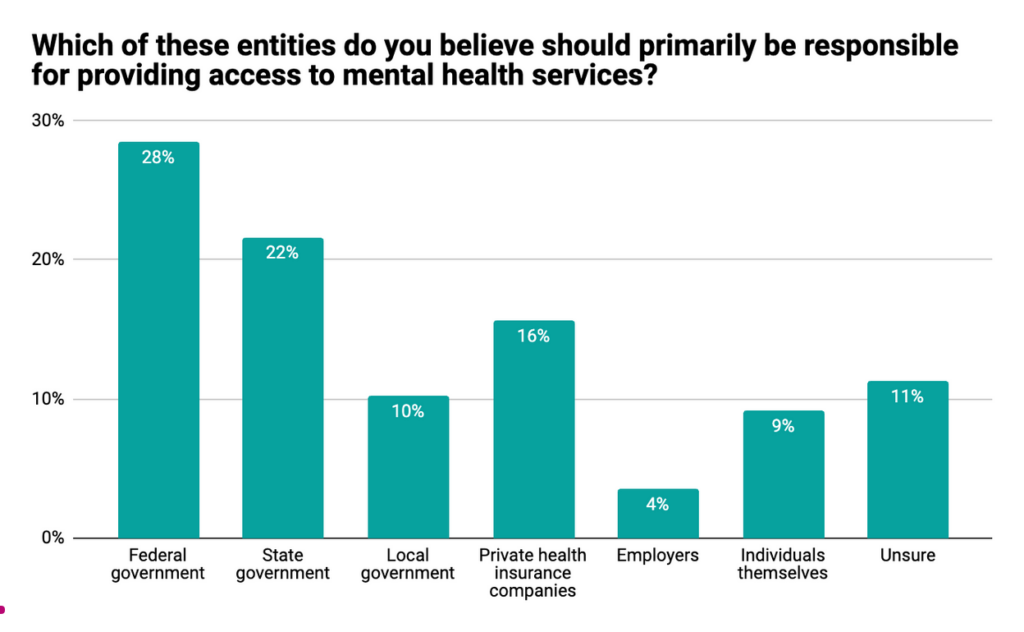Responsibility and Barriers to Accessible Mental Health Services May 7, 2024
In today's evolving landscape of mental health awareness, a fundamental question persists: who should be responsible for ensuring accessible mental health services? Citizen Data intended to understand public perceptions on this matter, delving into the perspectives of individuals from diverse backgrounds.

Written by Samantha Carcache
In today’s evolving landscape of mental health awareness, a fundamental question persists: who should be responsible for ensuring accessible mental health services? Citizen Data intended to understand public perceptions on this matter, delving into the perspectives of individuals from diverse backgrounds.
The survey, conducted across 1,010 participants spanning different races, genders, age groups, and political ideologies, aimed to uncover not just who should provide access to mental health services, but also the greatest barriers hindering individuals from seeking essential treatment.
Access to Mental Health Services
As the survey data unfolded, interesting insights emerged. A significant 60% of respondents leaned towards federal, state, or local government entities as responsible for providing access to mental health services. Surprisingly, only 9% indicated individuals themselves as accountable. Yet, a large portion across demographics remained uncertain, suggesting a knowledge gap around mental health services’ availability and impact.
Navigating Barriers
Beneath the surface of these perceptions lies the many challenges that individuals face accessing mental health treatment. The survey illuminated these challenges, with 42% identifying cost as the most significant. However, nuances within demographics shed further light. As age increases, respondents are less likely to view cost as the foremost barrier and see negative perception of mental illness, lack of access to providers/facilities, and time constraints as bigger barriers than their younger counterparts. Breaking it down further revealed that individuals aged 18-34 were more likely to identify ‘lack of information on available services’ as their primary challenge compared to all other age groups.

Breaking Down Barriers by Race
An insightful breakdown of the data reveals a notable trend: the Asian community is much more likely to identify “lack of access to providers/facilities” as their primary barrier, with 32% of respondents expressing this concern, surpassing the national average of 21% by 11 percentage points. Interestingly, this community also exhibits the lowest tendency to cite “negative perception of mental illness” as a barrier to accessing mental health services. In contrast, both the Black community and individuals identifying as “other” besides White, Black, Hispanic/Latino, and Asian were more likely to indicate “negative perception of mental illness” as a bigger barrier than “lack of access to providers/facilities”.
This contrast highlights the disparities in how different racial groups perceive and navigate mental health challenges and underscores the importance of addressing cultural attitudes and stigmas surrounding mental health within diverse communities.
Turning Insights Into Action
These findings ignite a call to action, compelling policymakers and healthcare providers to reassess current structures and implement targeted interventions. From tailored educational campaigns to community-driven initiatives, addressing diverse barriers demands a multifaceted approach.
In our journey towards mental well-being, every voice carries weight. Continuous survey research is vital to understand and track evolving attitudes towards mental health, ensuring policies align with public concerns.
Citizen Data supports our partners that work on a wide range of societal issues, offering tailored research programs to uncover authentic opinions and attitudes. If this resonates with your organization’s mission, please engage with us by filling out this form and we’ll be in touch shortly.
Methodology: The survey, conducted as part of our monthly omnibus survey, sampled N = 1,010 registered voters during February 2024. The margin of error is +/- 3.1%, and the results are weighted by Party ID, race, age, and education, ensuring a nationally representative sample.
Share this report
NY Hush Money Trial Could Spell Trouble for Trump in November
Given the unprecedented nature of this case, Citizen Data wanted to better understand how the trial of former President Trump affects his support and overall electability come November. While a majority of voters—59%—say the trial hasn’t affected their support for Trump, a significant minority (41%) report that it has.
